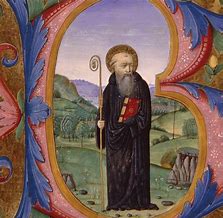O Clavis David, et sceptrum domus Israel, qui aperis, et nemo claudit, claudis, et nemo aperit: veni, et educ vinctum de domo carceris, sedentem in tenebris, et umbra mortis.
O Jesus, Son of David! heir to his throne and his power! thou art now passing over, in thy way to Bethlehem, the land that once was the kingdom of thy ancestor, but now is tributary to the Gentiles. Scarce an inch of this ground which has not witnessed the miracles of the justice and the mercy of Jehovah, thy Father, to the people of that old Covenant, which is so soon to end. Before long, when thou hast come from beneath the virginal cloud which now hides thee, thou wilt pass along this same road doing good (Act 10), healing all manner of sickness and every infirmity (Matt 4) and yet having no where to lay thy head (Luc 9). Now, at least, thy Mother's womb affords thee the sweetest rest, and thou receivest from her the profoundest adoration and the tenderest love. But, dear Jesus, it is thine own blessed will that thou leave this loved abode. Thou hast, Eternal Light, to shine in the midst of this world's darkness, this prison where the captive, whom thou art come to deliver, sits in the shadow of death. Open his prison-gates by thy all-powerful Key! And who is this captive, but the human race, the slave of error and vice? Who is this captive, but the heart of man, which is in thrall to the very passions it blushes to obey? Oh, come and set at liberty the world thou hast enriched by thy grace, and the creatures whom thou hast made to be thine own Brethren.
Antiphon to the Archangel Gabriel.
O Gabriel, nuntius caelorum, qui ianuis clausis ad me intrasti, et Verbum nuntiasti: concipies et paries, Emmanuel vocabitur.
Dr Eleanor Parker, writing about the Os from the Exeter Book, posted this essay on O clavis David in 2013. Its conclusion (the Gif onlucan wile comes from the AS poem Exodus).
Gif onlucan wile lifes wealhstod,beorht in breostum, banhuses weard,ginfæsten god gæstes cægon,run bið gerecenod, ræd forð gæð.If the interpreter of life, the guardian of the body, bright in heart, wishes to unlock ample benefits with the keys of the spirit, the mystery is explained and wisdom comes forth.Our poet seems to imagine the Key of David working in a similar way. What is unlocked by the Key is 'light', and in describing mankind as sunnan wenað, 'hoping for the sun', this lyric makes use of the Son/sun wordplay I mentioned recently - probably the earliest surviving example of the device in English poetry. This poem is about the opening of hidden knowledge, and appropriately for a poem, this opening is connected specifically to poetry itself, the bringing to light the truth of the witgena woðsong, 'the prophets' resounding song'. As King David is both prophet and psalm-singer, this takes us back to the opening of the antiphon. The final lines promise that reorda gehwæs ryne, 'the secret of every utterance' will be magnified, and this utterance, the poem itself, is surely included. Thus we, in reading the poem, are encouraged to finish in union with poets and prophets, as 'those who earnestly desire to praise the name of the Creator'.
LDVM

Comments
Post a Comment